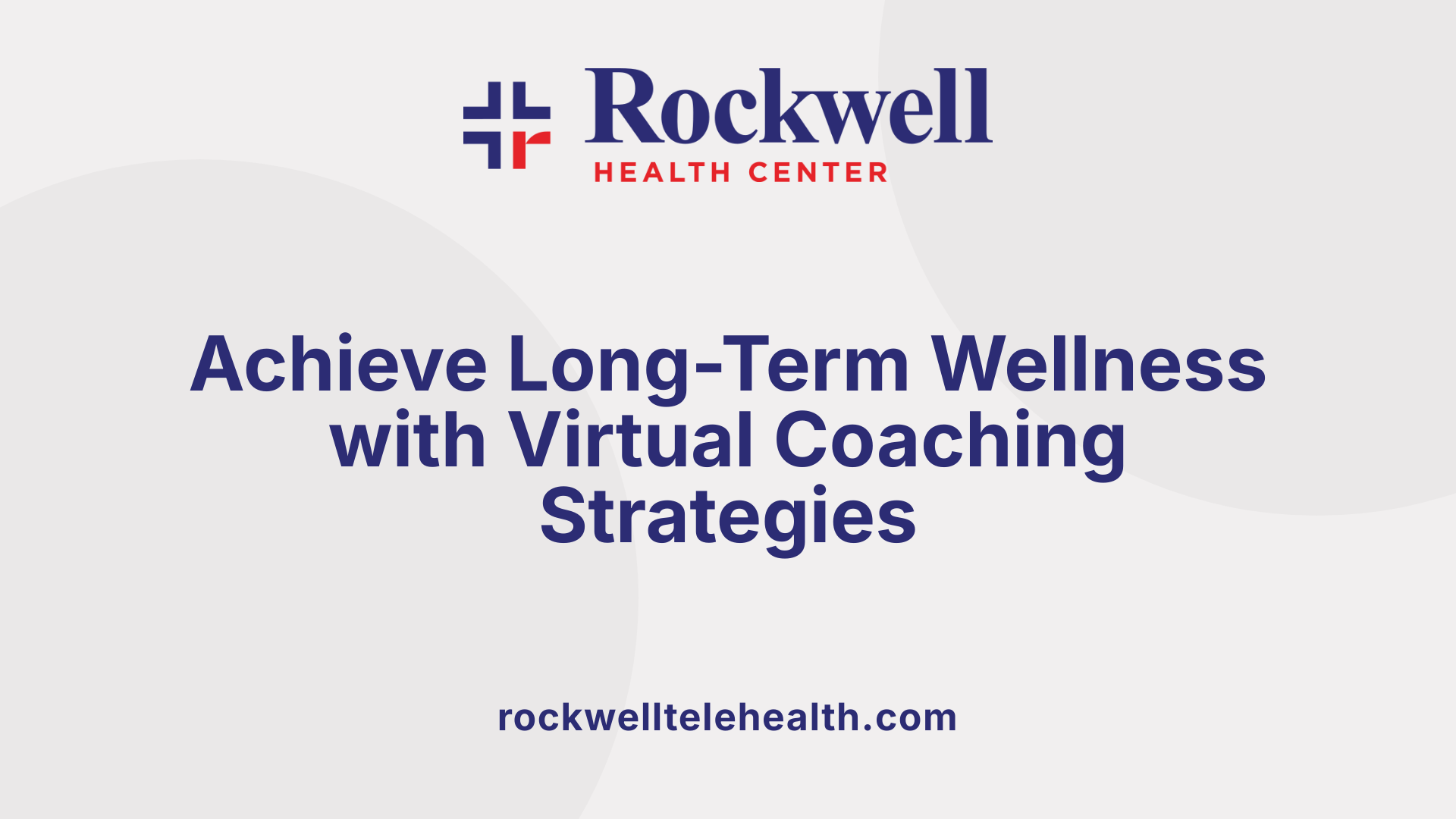Transforming Wellness Through Digital Access
In recent years, virtual wellness coaching has emerged as a transformative approach in health management, leveraging the power of digital technology to deliver personalized, accessible, and effective support for improving nutrition and lifestyle habits. This approach caters to a wide range of health objectives, from managing chronic conditions to lifestyle modifications such as weight loss, stress reduction, and mental health enhancement, all tailored to the individual’s needs.
Understanding Virtual Wellness Coaching and Its Role in Health Enhancement

What is virtual wellness coaching?
Virtual wellness coaching is a healthcare service delivered remotely through digital platforms, enabling clients to access personalized health support from the comfort of their homes. Certified coaches and health professionals conduct sessions via phone, video calls, or online chat, focusing on helping individuals improve their nutrition, physical activity, stress management, and overall lifestyle.
The primary goal of virtual coaching is to foster sustainable behavioral changes that enhance health and happiness. Coaches work collaboratively with clients to set realistic goals, address barriers, and develop tailored strategies for long-term success. Using various tools such as health tracking devices, specialized apps, and online resources, they monitor progress and adjust plans accordingly.
This approach makes wellness support more accessible and convenient, especially for those with busy schedules or limited local options. It emphasizes empowerment through reflection, education, and motivation, ensuring clients are active participants in their health journey.
How does virtual coaching address nutrition and lifestyle improvements?
Virtual wellness coaching is particularly effective in guiding nutrition and lifestyle modifications. Whether managing weight, improving diet quality, or developing healthy habits, coaches provide customized advice that considers individual preferences and circumstances.
Clients often receive practical help with meal planning, portion control, and understanding nutritional labels. Coaches also assist with increasing physical activity and integrating exercise routines into daily life. Additionally, they work on stress reduction techniques, sleep hygiene, and work-life balance strategies.
For chronic conditions like diabetes, hypertension, or mental health issues, virtual coaches tailor interventions to support disease management through lifestyle changes. They help clients navigate challenges, develop resilience, and stay motivated through ongoing encouragement.
Tools and methods used in virtual coaching
Virtual wellness programs leverage a variety of technology-driven tools to enhance effectiveness. Common methods include:
- Video and phone sessions: Facilitate real-time interaction, goal setting, and progress review.
- Health tracking devices: Wearables and apps monitor activity, sleep, and dietary habits.
- On-demand classes: Cover topics such as managing stress, healthy eating, and physical activity, providing flexible learning options.
- Online chat and email support: Offer continuous encouragement and guidance between sessions.
- Personalized programs: Use AI-driven insights, immersive simulations, and habit-building strategies for tailored plans.
- Educational modules: Cover behavior change theories, resilience building, and lifestyle medicine principles.
Through these tools, virtual coaches create engaging, adaptive programs that address individual needs and promote sustainable health improvements. They aim to empower clients to maintain healthier habits long-term, ultimately leading to better overall well-being.
Benefits of Virtual Wellness Coaching for Health and Lifestyle

What are the benefits of virtual wellness coaching for health and lifestyle?
Virtual wellness coaching provides a range of advantages that support individuals in making meaningful, lasting changes to their health and daily routines. This approach offers personalized guidance tailored to the unique needs and goals of each person, making the process more engaging and relevant.
One of the primary benefits is the potential for improved physical health. Coaches assist with managing weight, controlling blood pressure and blood sugar, and adopting healthier diets and activity levels. Techniques such as motivational interviewing and specific goal-setting help users stay focused and motivated.
The convenience of virtual sessions means individuals can access coaching from home or any comfortable location, fitting health support easily into busy schedules. Regular check-ins foster consistent accountability, increasing the likelihood of success. Many programs leverage data from fitness trackers, sleep monitors, and food journals to customize advice and track progress in real time.
Beyond physical health, virtual coaching can positively impact mental and emotional well-being. Coaches help clients identify stressors, develop resilience, and cultivate habits that enhance overall happiness. This holistic approach promotes a balance between physical and mental health.
Ultimately, virtual wellness coaching empowers individuals to take an active role in their health journey. It encourages sustainable lifestyle changes that can lead to lasting improvements in well-being. With measurable outcomes and often at a lower cost compared to traditional in-person services, these programs represent an accessible, effective way to support long-term health goals.
What Virtual Wellness Coaches Do and How They Help

What does a virtual nutrition or wellness coach do?
A virtual weight or wellness coach offers tailored support to clients aiming to improve their health through personalized, evidence-based strategies. These coaches help set achievable goals, monitor progress, and provide consistent motivation and accountability. They review food journals, track behavioral changes, and modify plans to ensure continuous improvement.
Often certified professionals such as registered dietitians, health educators, or behavior change specialists carry out these roles. They deliver scientifically-supported advice on nutrition, physical activity, stress management, and lifestyle habits, ensuring recommendations are safe, practical, and uniquely suited to each individual.
Beyond basic dietary guidance, virtual coaches educate clients about sustainable nutrition practices. They help manage chronic illnesses, optimize athletic performance, or improve mental health by teaching how to make informed food choices. Their goal is to foster long-term health improvements, steering clear of fad diets or quick fixes.
Role of coaches as health professionals
These coaches function as trusted health advisors, often working collaboratively with other healthcare providers to ensure comprehensive care. They assess each client’s unique needs, health status, and lifestyle factors to design personalized plans.
Their expertise includes understanding nutrition science, behavioral psychology, and lifestyle medicine. This allows them to provide accurate, current information and support effective behavior change.
Monitoring progress and adjusting plans
Regular check-ins allow coaches to evaluate progress, celebrate successes, and address challenges. Using tools like food logs or activity trackers, they gather feedback to refine plans, making adjustments that match evolving needs and preferences.
This ongoing process helps clients stay motivated and committed, improving adherence to healthier behaviors over time.
Focus on sustainable lifestyle changes
Unlike quick-fix diets, virtual wellness coaching emphasizes long-term, sustainable lifestyle modifications. Coaches encourage habits such as balanced eating, regular physical activity, stress reduction, and quality sleep.
They support clients in developing routines that fit seamlessly into daily life, promoting resilience and self-efficacy. The ultimate aim is to help individuals make lasting changes that contribute to better health and happiness.
Accessing and Enrolling in Virtual Wellness Programs
Platforms and tools for virtual coaching
Many reputable organizations now offer online wellness coaching through secure digital platforms. These include dedicated websites such as Virtual Health Coaches, which connect users with certified health professionals for personalized sessions. Other platforms like Columbia Health, Headspace, and YourCoach.Health provide virtual coaching or therapy via video calls, text, or app-based messaging. These tools make it convenient to access expert guidance from any location, helping individuals manage health conditions, improve nutrition, or develop healthier habits.
Steps to find reputable programs
Start by researching platforms that are accredited or have certified health professionals. Look for services that match your wellness goals, whether it’s weight management, stress reduction, or chronic condition support. Reading reviews and checking credentials can help ensure you select a trustworthy provider. You can also ask your healthcare provider for recommendations or verify if your insurance covers specific programs.
Intake processes and goal setting
Most programs require an initial intake process, which may involve filling out questionnaires about your health history, current habits, and specific goals. This step helps coaches tailor their advice to your needs. During the first session, coaches will work with you to establish clear, achievable goals and develop a plan of action. This personalized approach enhances motivation and increases the likelihood of long-term success.
Technology considerations and privacy
When choosing a virtual wellness program, ensure the platform complies with privacy regulations such as HIPAA in the U.S. to safeguard your personal health information. A reliable program will use encrypted communication and secure storage. Additionally, verify that the platform supports accessible technology, including mobile apps or desktop compatibility, to fit your routines. Good internet connectivity and a quiet, private space are also essential for effective coaching sessions.
Program Content, Structure, and Certification Opportunities in Virtual Wellness Coaching
What are the typical modules and content included in virtual wellness coaching programs?
Many virtual wellness coaching programs incorporate modules focused on nutrition, behavior change, stress management, and lifestyle medicine. For example, Harvard Medical School’s 15-week online course covers topics like healthy eating patterns, behavioral science, rapport building, motivation strategies, and resilience techniques. Other programs might include specific modules on weight management, smoking cessation, fall prevention, and brain health.
In addition, many platforms, such as EON Reality, offer immersive simulations, personalized habit-building plans, and real-time feedback to enhance learning and practical application. Support often includes tips on sleep hygiene, exercise routines, and work-life balance, helping participants apply concepts to real-world situations.
How long do these programs typically last, and are they self-paced?
Most virtual wellness and lifestyle coaching courses are designed to be flexible, allowing participants to learn at their own pace. Harvard’s program, for instance, spans 15 weeks but is self-paced, giving learners the freedom to progress according to their schedules. Similarly, many programs offer access to on-demand classes and modules for a year or more, providing continuous learning opportunities.
These formats enable busy professionals and health enthusiasts to balance education with personal commitments while gaining skills in health coaching, nutrition, and behavior modification.
What are the certification benefits and potential career advantages?
Obtaining certification from reputable programs can boost credibility and career prospects in health and wellness. Certifications like the NBC-HWC from NBHWC or courses from Harvard Medical School add recognized credentials to your professional profile.
Certified health coaches typically enjoy increased opportunities for employment, higher earning potential, and the ability to serve as trusted support figures in healthcare teams. Many certifications also offer continuing education credits (CEUs), helping professionals stay current with industry standards.
How do these programs incorporate lifestyle medicine and behavior change strategies?
A strong emphasis is placed on science-backed approaches to lifestyle medicine, including diet, exercise, sleep, and stress management. Many courses teach behavioral change theories, rapport-building techniques, and motivational interviewing skills.
For example, Annie Barrett’s coaching integrates principles of lifestyle medicine, habit science, and Ayurveda to foster sustainable health improvements. Participants learn how to assess individual lifestyles, develop personalized plans, and encourage lasting behavior change. These skills empower health professionals and enthusiasts to support long-term health and happiness, making the programs highly applicable across various settings.
| Program Focus | Content Features | Certification & Outcomes |
|---|---|---|
| Nutrition & Diet | Meal planning, dietary habits, disease prevention | Professional certification, career advancement |
| Behavior Change | Motivational interviewing, habit science, resilience | Credibility, CEUs, recognition |
| Lifestyle Medicine | Stress, sleep, physical activity | Long-term health impact, client trust |
| Immersive Learning | Simulations, real-time feedback | Practical skills, confidence |
| Education Flexibility | Self-paced, on-demand access | Accessibility, personal growth |
How Virtual Coaching Supports Long-Term Health and Lifestyle Success

How does virtual wellness coaching support health and wellness goals?
Virtual wellness coaching plays a vital role in helping individuals achieve and maintain their health objectives through personalized and adaptable support. By utilizing digital platforms, coaching services can tailor guidance based on each person's unique needs, preferences, and health status. This approach allows clients to receive regular feedback, track progress, and make adjustments in real-time, often using apps, wearables, or online tools.
A focus of these programs is to address various facets of health, including nutrition, physical activity, mental well-being, and stress management, promoting sustainable change. Accessibility is a major advantage; clients can schedule sessions at their convenience, access resources remotely, and receive ongoing support regardless of location.
Technological integration enhances motivation and accountability by providing community features, progress tracking, and immediate feedback. For instance, AI-powered health platforms analyze personal data like sleep, dietary habits, and daily routines to customize plans. This combination of personalization, technology, and community fosters an environment where long-term health and lifestyle goals are more achievable.
Behavior change theories and resilience building
Effective virtual coaching often incorporates scientific principles of behavior change such as the transtheoretical model, motivational interviewing, and habit formation science. These frameworks help clients develop resilience by understanding their behavioral patterns, overcoming obstacles, and maintaining motivation over time.
Resilience building is crucial for adapting to challenges and preventing relapse. Coaches work with clients to set realistic goals, celebrate incremental successes, and develop coping strategies for setbacks, ensuring progress continues even during difficult times.
Use of innovative AI and immersive tech
Advanced technology enhances virtual coaching with immersive experiences like virtual reality exercise environments, AI-driven insights, and personalized simulations. For example, AI analyzes user data to generate customized fitness routines, dietary recommendations, and stress reduction techniques tailored to individual energy levels and motivation.
Immersive tech offers engaging experiences that motivate users to stick with their health routines, making lifestyle changes more enjoyable and sustainable. Real-time feedback and adaptive programs help optimize progress while maintaining user interest.
Long-term goal setting and habit maintenance
Successful virtual coaching emphasizes long-term planning by establishing achievable milestones and fostering habits that stick. Coaches assist clients in designing realistic, measurable goals and using behavioral science strategies to embed these habits into daily life.
Follow-up sessions and digital monitoring keep clients accountable, making it easier to maintain progress. These programs focus on creating habits around nutrition, exercise, and stress management that support ongoing health and happiness.
Building community and support systems
Many virtual coaching platforms promote community engagement through online groups, forums, and peer support features. Such environments help reduce feelings of isolation and increase motivation through shared experiences.
Support networks created within these platforms provide encouragement, accountability, and a sense of belonging—factors that are critical for sustaining lifestyle changes over the long term.
The integration of personalized coaching, innovative technology, and community support ensures that individuals are well-equipped to pursue healthier lifestyles with confidence and resilience, leading to lifelong wellness.
Embracing the Future of Health and Wellness
Virtual wellness coaching represents a powerful evolution in healthcare, merging technology with personalized support to make health improvement more accessible and sustainable than ever before. Its tailored approach addresses diverse wellness needs, from nutrition to mental health, fostering long-lasting lifestyle changes. As the field advances, certification opportunities are expanding, equipping more professionals to guide individuals effectively. Whether you're seeking to enhance your practice as a health professional or looking for a flexible, proven way to meet your health goals, virtual coaching offers a promising path forward in achieving holistic, well-rounded well-being. Embracing this innovative service not only promotes individual health but also contributes to a broader shift toward accessible, patient-centered care.
References
- Wellness Care | Health Coaching & Dietitian Counseling
- Wellness Coaching | My Doctor Online - Kaiser Permanente
- Live Life Well On-Demand - Health and Wellness Classes
- Holistic Wellness Coaching | Vibrant Soulful Wellness
- Nutrition and Wellness Coaching - Harvard Medical School
- EON Reality Launches AI-Powered Health & Wellness Coach to ...
- Health Coaching | UPMC Health Plan
- Wellness Coaching and Nutrition Counseling | Fiserv
- Evaluating the Impact of a Virtual Health Coaching Lifestyle Program ...
- Health Coaching Services: 7 Powerful Benefits in 2025 - LifeSTEPS


































.png)